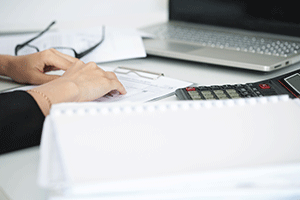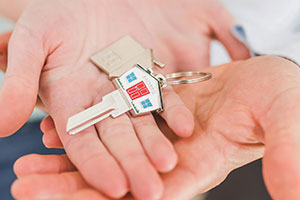
When Are Business Owners Personally Liable for Business Debt?
If you own a business or are considering starting one, you might be wondering, when are business owners personally liable for business debt? Any business owner should understand if and when their personal assets and finances are at risk due to business debt.
Knowing what happens to business debt when a business fails is essential for any new or potential business owners. Personal liability for business debt often depends on how a business is structured — for example, whether it’s an LLC, corporation, or sole proprietorship. Further, it’s important to grasp how to protect personal assets and property when facing business debt.
Are You Personally Liable for Your Business Debts in Ohio?
Personal liability for business debt often hinges on the structure of your business and the nature of your loan contracts. If your business falls into one of four of the most common business structures (i.e., sole proprietorship, partnership, LLC, or corporation), personal liability will vary. So are you personally liable for your business debts in Ohio? That may depend on your business structure, described below.
- Sole proprietorship – If you are the sole owner of a business and have not formed an LLC or corporation, your business is likely considered a sole proprietorship. If so, you and your business are legally one, and your personal finances and property can be used to repay business debts.
- General partnership – If you and others have formed a partnership that owns your business, you and your partners could be personally liable for business debts. Regardless of each partner’s ownership percentage, the partnership is together liable for debt.
- Limited liability company (LLC) – If your business is an LLC, it’s considered a separate legal entity, meaning you are not personally liable for its debts. Typically, creditors can pursue an LLC’s assets but cannot pursue those of its member owners.
- Corporation – Corporations are owned by shareholders. Shareholders are typically protected from a corporation’s business debts, as a corporation is also a separate business entity.
However, are you personally liable for your business debts based on a lender contract? That depends. If you signed a loan or lending contract that included a personal guarantee for a line of credit or loan, you would be responsible for business debts. Lenders often require new small businesses to sign a personal guarantee.
What Happens to Debt When an LLC Fails?
Owners of an LLC are typically protected from their business’s debt, but what happens to debt when an LLC fails? When this occurs, creditors can pursue an LLC’s assets. If an LLC owner signed a personal guarantee for the owed debt, they may then be responsible. If an owner cannot pay the debt, declaring bankruptcy may be the best option. In 2022, new legislation was enacted that limited the time frame in which creditors could file a claim against a dissolved LLC.
What Happens to Business Debt When a Business Fails?
Is Bankruptcy Your Best Option?
If there are not enough assets to cover debts after a business fails, and if an owner is personally responsible for the debt, declaring bankruptcy could be the best course. While exactly what happens to business debt when a business fails will depend on assets and business structure, owners who are liable for debt might not have many options.
IF YOU’VE ASKED YOURSELF WHAT HAPPENS TO BUSINESS DEBT WHEN A BUSINESS FAILS, BE SURE TO UNDERSTAND BANKRUPTCY AND THE PROTECTIONS IT CAN OFFER.
Types of Bankruptcy and Obtaining Debt Relief
Chapter 7 Bankruptcy
Chapter 7 bankruptcy is the most common form of bankruptcy and provides one of the fastest ways to get a fresh financial start. Almost any business or individual can file for Chapter 7 bankruptcy, but only sole proprietors can have their qualifying debt wiped out (discharged). If you are the sole proprietor of your business, you are responsible for its debts, and your bankruptcy would include both your personal and business debts and assets.
By working with a Chapter 7 lawyer, your business stops operating, and all assets that are not covered by Ohio exemptions get sold by a trustee. Proceeds go to your creditors to satisfy as many debts as possible, including lease obligations, credit cards, loans, and contracts.
Chapter 7 bankruptcy makes it easier to liquidate a failing business because the trustee will be doing the job of selling products, fixtures, or equipment, attempting to collect accounts receivable, and settling with creditors. This makes closing easier and may save the business money by avoiding further creditor claims.
Chapter 13 and Chapter 11 Bankruptcy
Chapter 13 Bankruptcy is available only to individuals and sole proprietors of a business, as the owner’s personal finances are included in the reorganization plan. If your business is a partnership or corporation, you may be able to achieve a similar debt relief by filing for Chapter 11 bankruptcy.
Chapter 13 and Chapter 11 bankruptcies do not liquidate your business; they allow the business to reorganize and pay back its debts under better terms. The business can continue operating and has a chance to recover as long as it can make the monthly payments agreed upon in your bankruptcy case. After declaring bankruptcy, you get protection from creditors and can potentially keep more property.
A business that is a separate legal entity, such as a corporation or LLC, should be able to file bankruptcy independent from the business owners. The owners should not be personally responsible unless they have personally guaranteed the debts or have taken other similar action.
Chapter 11 is typically used by larger, established companies as it may be too costly for a small business with a limited income.
Chapter 12 Bankruptcy
This type of bankruptcy is similar to Chapter 13 but is available only to family farmers and fishermen.
Facing Business Debt and Bankruptcy? We Can Help.
Every business owner must understand the answers to the question, “When are business owners personally liable for business debt?” If you are personally liable for business debts and you can’t afford to pay them, our bankruptcy attorneys can help.
At Fesenmyer Cousino Weinzimmer, we can help evaluate your situation and finances during a free consultation. If bankruptcy is the right step, we will guide you through the process and get you the financial protections and debt relief that you need.
GIVE OUR LEGAL TEAM A CALL AT 614-228-4435 (COLUMBUS), 937-222-7472 (DAYTON), OR 877-654-5297 (CINCINNATI) TO LEARN MORE ABOUT HOW WE CAN HELP.


